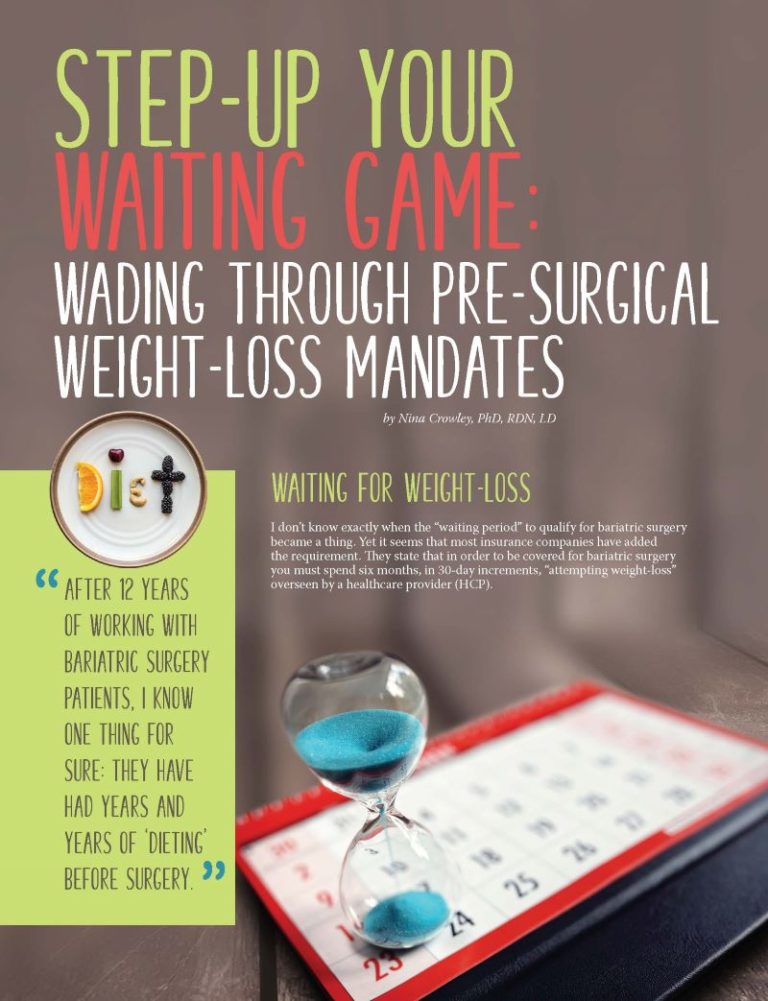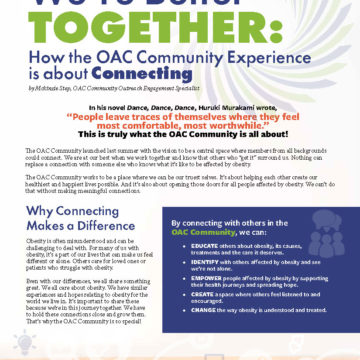Step-up Your Waiting Game: Wading through Pre-surgical Weight-loss Mandates


by Nina Crowley, PhD, RDN, LD
Summer 2019
Waiting for Weight-loss
I don’t know exactly when the “waiting period” to qualify for bariatric surgery became a thing. Yet it seems that most insurance companies have added the requirement. They state that in order to be covered for bariatric surgery you must spend six months, in 30-day increments, “attempting weight-loss” overseen by a healthcare provider (HCP).
You might wonder… are these requirements for health and safety reasons? Or are they just a series of paperwork and office visits to complicate the process? Let’s take a look.
Claim: Requiring a six-month HCP-managed weight-loss time frame will “improve surgical outcomes.”
Truth: There is no evidence to prove this statement. Many studies show required weight-loss efforts are not likely to improve weight-loss after surgery.
Additional studies show many patients actually gain weight during the waiting period before surgery. This can cause the patient’s overall health to become worse. It can also mean that the patient will no longer qualify for bariatric surgery. Looking at the bigger picture, it seems (in a way) that waiting periods might be a cost-saving action by the insurance companies to avoid covering as many surgeries.
Weight-loss before surgery may not pose any additional risk. However, mandated weight-loss may be harmful for those who cannot meet the requirement. These patients will continue to suffer the effects of living with obesity and will be denied the improved health and quality of life that follows surgery.
Don’t Focus on the Wait (or the Weight)
Facing a required weight-loss period by your insurance company can be hard. How do you make the best of it without feeling discouraged and stay focused on making healthy lifestyle changes?
After 12 years of working with bariatric surgery patients, I know one thing for sure: they have had years and years of “dieting” before surgery. I put dieting in quotes because I refer to it here not as “what you eat,” but restrictive eating with a short-term goal. While many of my patients were able to lose weight, they struggle to keep that weight off long term.
Efforts for rapid weight-loss are often associated with:
- High-school athletes running around in reflective gear or black trash bags “sweating it out”
- Fasting and fad-diets
- Extremely restrictive diets
- Disordered eating and even malnutrition
The methods used to lose weight quickly when “required” are very different from the healthy eating plans we build with patients after surgery. This poses a problem. In the time before surgery, when you need to focus on creating healthy lifestyle habits and preparing for post-surgery eating, many patients “do what it takes” to lose weight. This can make it harder for them to create and practice the changes they need to keep after surgery.
Wading through it
I think it is best to view the required waiting period as a chance to prepare for your life after surgery. I like to have my patients practice the post-op life. I have them focus on habits they can build into lasting behavior change, such as:
- Begin meal planning like you would after surgery (pre-surgery portions will be larger, but aim for a balance of food groups and timing of meals).
- Start taking vitamins regularly.
- Try not to focus on foods you will never have again. This could lead to a “last supper” approach to eating before surgery that can cause weight gain. Think about what new foods you get to try!
- Talk with your surgeon and form a realistic view about life following surgery. Take time to talk about your relationships, routines and environment. Find behaviors that might help lead to success if continued post-surgery.
- Make time for physical activity before surgery. Making it a habit before surgery will make it easier to maintain afterwards.
- Become a regular at a support group. It can be helpful to learn from others and to share your journey.
- Write down your thoughts, feelings and emotions in a journal. You can also track what you eat, how often you eat and what your activity habits look like. Writing this down might help you find ways to make and keep healthy lifestyle choices.
- Be honest with yourself. Now is the time to work on thethings you think will be hardest so you can go into surgery as strong as possible.
Wait for it
Whatever you do, don’t let the waiting period discourage you or stop you from having bariatric surgery. Turning healthy choices into habits is never easy, but it’s so worth it. Use this time to prepare for life after surgery. Those months will fly by and you won’t regret making this investment in your future!
About the Author:
Nina Crowley, PhD, RDN, LD, is an advocate for patient-centered care and appropriate treatment for people with obesity. She leads the interdisciplinary metabolic and bariatric surgery team at the Medical University of South Carolina in Charleston, South Carolina. Dr. Crowley loves public speaking and enjoys presenting to professional and patient audiences about behavior change, counseling, weight bias, and taking action through public policy. Nina is active in several local and national professional organizations and is currently serving as member at large on the Integrated Health Executive Council of the American Society for Metabolic and Bariatric Surgery (ASMBS), the Policy and Advocacy Leader for the Weight Management Dietetic Practice Group of the Academy of Nutrition and Dietetics, and a member of the OAC National Board of Directors.
by Robyn Pashby, PhD Winter 2024 “No one is ever going to date you if you don’t…
Read Articleby Kendall Griffey, OAC Communications Coordinator Winter 2024 The Obesity Action Coalition’s 12th annual Your Weight Matters…
Read Articleby Nina Crowley, PhD, RD (with Inspiration from Shawn Cochran) Winter 2024 Dating, no matter your age,…
Read Article








